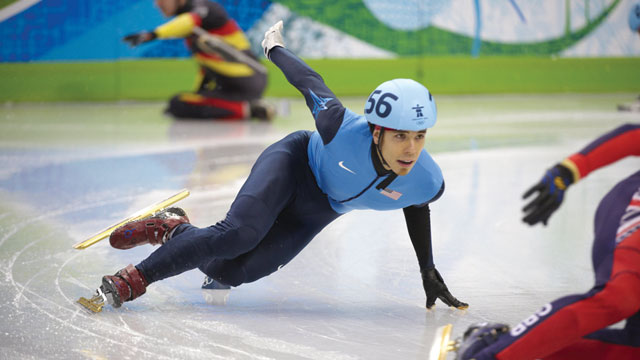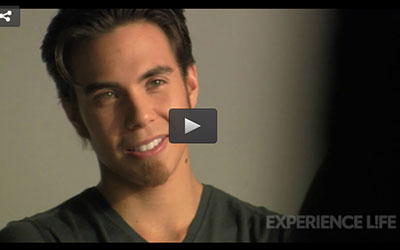Anyone who’s followed the Winter Olympics over the past dozen years knows that Apolo Ohno is one of the world’s premier short-track speed skaters. What you might not know is that he’s also a devoted techie. “I’m a total tech freak,” he admits. “Car electronics, home electronics, smartphones. I mean everything. I love all that stuff.”
So it’s not surprising to learn that Ohno, 28, has always embraced cutting-edge sports science and technology during his 16 years of competitive skating.
“Everything that goes into becoming a superathlete comes from the science,” says the eight-time Olympic medal winner. “[Science allows] athletes to train harder and longer and more efficiently than ever before.”
He swears by tools like the Wingate test, which measures peak anaerobic power, anaerobic fatigue and total anaerobic capacity; power-to-weight ratio testing to balance ideal body weight and muscle power; blood screenings to identify nutritional deficiencies; and metabolic tests to fine-tune his workouts.
While sports science and technology have always been part of elite athletic training, says Ohno, they’ve become increasingly essential to his own fitness strategy of late. “In the last four years I’ve really implemented not just the nutrition piece but also knowledge from sports science,” he says. “I’ve really learned about the biomechanics of the body and how to periodize my training.”
Speed skating, because it is a unique sport, has its own special set of tests and technology. “Sports science is very hard to exactly apply to what we do,” Ohno explains. “We train so differently because the body position we’re in is very unorthodox. So we have to find unique, cool ways of testing.” That includes a tool in the skate that measures how much pressure you can apply to your blade and to the ice.
Whatever technology he’s embraced appears to be working. The 12-time U.S. national champion — he won his first national title at 14 — is the most decorated U.S. Winter Olympian of all time. He became an instant celebrity after winning two Olympic medals at the 2002 Winter Olympics, and he’s found himself in the spotlight ever since — and not just on the ice. He wowed the judges on ABC’s hit reality show Dancing with the Stars in 2007, taking home the top prize with partner Julianne Hough.
It was a similar combination of grace and skill that first drew the Seattle native to speed skating. “It looks like it defies gravity and the laws of physics,” says Ohno. “These guys skate around this ice rink on a samurai sword at 35 to 40 miles an hour leaning at these impossible angles — we’re almost horizontal with the ice.”
A championship high school swimmer who enjoyed in-line skating, Ohno laced up his first pair of speed skates at 13 and was hooked almost immediately. “It’s a sport that has all the aspects one could want. It has speed. It has precision. It has strategy. It has danger. It has explosive movements. It’s unpredictable and a little bit crazy.”
Ohno is still training, but remains mum about whether he will compete at the 2014 Games in Sochi, Russia. “I know I will be in Sochi. It’s just whether I’ll have my skates or a microphone with me,” he says.
While he ponders his competitive future, Ohno is focused on promoting 8 Zone, a nutritional supplement that he created using the science and nutrition knowledge he’s accumulated over the years. He maintains a daily meditation practice, and he’s putting the finishing touches on a memoir, Zero Regrets, due out from Atria Books, a division of Simon & Schuster, this fall.
He’s also very active online, where he stays in touch with followers and family via Facebook and Twitter (where he has more than 187,000 followers). “I think out loud a lot, and finally I’m able to put my thoughts onto a digital board that people can read,” he says. “They can see what goes on inside my brain.”
One audience Ohno is especially keen to reach is kids. Raised by a single dad, he understands the challenges many families face, so he promotes healthy lifestyles for young people through the Apolo Anton Ohno Foundation, and he’s an ambassador for the Century Council’s Ask, Listen, Learn initiative, a national program designed to combat underage drinking. He travels across the United States talking to kids about the importance of “staying active, staying healthy, and living a balanced, positive lifestyle.”
He’d also like to land back on TV, but this time he won’t be dancing. He wants to use this classic technology the same way he uses Web 2.0 — to send out positive messages about health. “I’d like to have my own talk show, and I’d like to talk about young people’s issues,” he says. “I’d like to provide some type of value in our society, do something that gets people to say, ‘I like watching this. This is what I’m interested in.’”
FREE Chapter of Zero Regrets!
Download the first chapter Zero Regrets by scanning this barcode with your smartphone! You’ll need Microsoft TagReader, which you can get for free, at http://gettag.mobi or from your smartphone’s application marketplace.


This Post Has 0 Comments